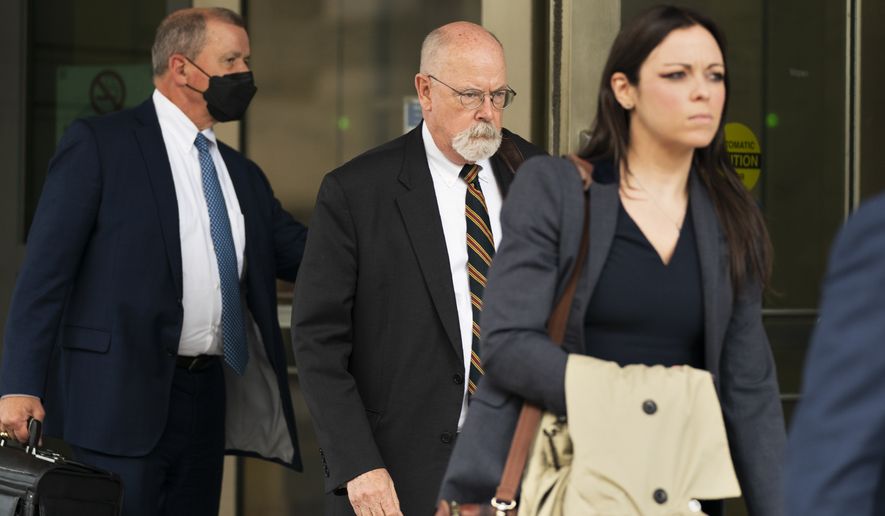Special counsel John Durham, in what is likely the final trial of his probe into the origins of the FBI’s Trump-Russia collusion investigation, let the bureau off the hook for misconduct, casting it as a hapless victim of a dishonest Russian analyst named Igor Danchenko.
Mr. Danchenko, a critical source for the anti-Trump dossier, lied to FBI officials and spurred their “troubling” behavior while going after the Trump campaign in 2016, prosecutors said Tuesday in opening statements at Mr. Danchenko’s trial.
“The Steele dossier caused the FBI to engage in troubling conduct. The defendant’s lies played a role in that conduct,” prosecutor Michael Keilty told the jurors in a federal courtroom in Alexandria, Virginia.
Mr. Danchenko, a U.S.-based Russian analyst who provided information that found its way into the dossier of salacious and unverified accusations about Mr. Trump, is on trial on five counts of lying to the FBI. He faces up to five years in prison for each count.
Mr. Durham’s team of prosecutors says Mr. Danchenko misled FBI agents about how he obtained information for the dossier, which was compiled by former British spy Christopher Steele and paid for by the Democratic National Committee and the Hillary Clinton campaign. FBI agents used the dossier to help obtain a warrant to wiretap Trump campaign aide Carter Page, who was suspected of working with Russia. Mr. Page was never charged with a crime, and no evidence emerged to support claims against him.
Mr. Keilty said the FBI relied on those lies to launch a “historic investigation” of a presidential candidate and later of Mr. Trump while he was president.
The portrayal of the FBI as a victim was yet another disappointment for Mr. Trump and his allies, who hoped Mr. Durham would expose a far-left conspiracy within the bureau and other U.S. intelligence agencies to sabotage Mr. Trump’s 2016 presidential campaign and undermine his presidency.
At the trial, Mr. Danchenko’s defense attorneys were the ones bashing the FBI. They blamed the FBI for asking vague questions and not following up with more questions.
“The questions weren’t asked properly, and that’s not his fault,” defense attorney Danny Onorato told the jurors.
He said Mr. Danchenko didn’t lie to the FBI. He said the Russian was a trusted and valuable source who worked as a confidential informant for the bureau.
Mr. Onorato said his client went to the FBI voluntarily to answer questions about the Steele report. He said his client offered speculation that Mr. Durham’s team is spinning as lies.
“He didn’t speculate to hinder the investigation, but to help it,” Mr. Onorato said.
The lawyer aggressively challenged Mr. Keilty’s claim that the FBI offered the defendant immunity in exchange for truthful testimony.
“That’s a lie. He just lied to you,” Mr. Onorato told the jurors. “You think about it when you listen to the government’s case.”
That fueled an eruption from Mr. Durham, who griped about Mr. Onorato’s remarks after the jury left the room. He told U.S. District Judge Anthony Trenga that the statement was “highly inappropriate” and urged the judge to tell the jury to disregard it.
The indictment accuses Mr. Danchenko of lying about how he obtained information for the dossier, including about his reliance on information from Democratic operative Charles J. Dolan, a public relations executive with close ties to Mrs. Clinton’s campaign.
Defense attorneys have said in court documents that the charges against Mr. Danchenko should be dropped because his answers to narrow questions from FBI agents were “literally true.” For example, Mr. Danchenko denied speaking with Mr. Dolan because he communicated with the Clinton operative through email exchanges.
The indictment also accuses Mr. Danchenko of lying about his contacts with Sergei Millian, a former president of the Russian-American Chamber of Commerce.
According to the indictment, Mr. Danchenko told the FBI that he spoke with Mr. Millian in July 2016 and the businessman told him that the Trump campaign was colluding with Russia to win the election. That information was included in the Steele dossier.
Those conversations never happened and the information turned over to Mr. Steele was made up, according to the indictment.
Defense attorneys say the information was relayed to Mr. Danchenko in an anonymous phone call from someone he believed to be Mr. Millian. They say the government can’t prove that the defendant made a false statement if he believed it was true.
• Jeff Mordock can be reached at jmordock@washingtontimes.com.




Please read our comment policy before commenting.